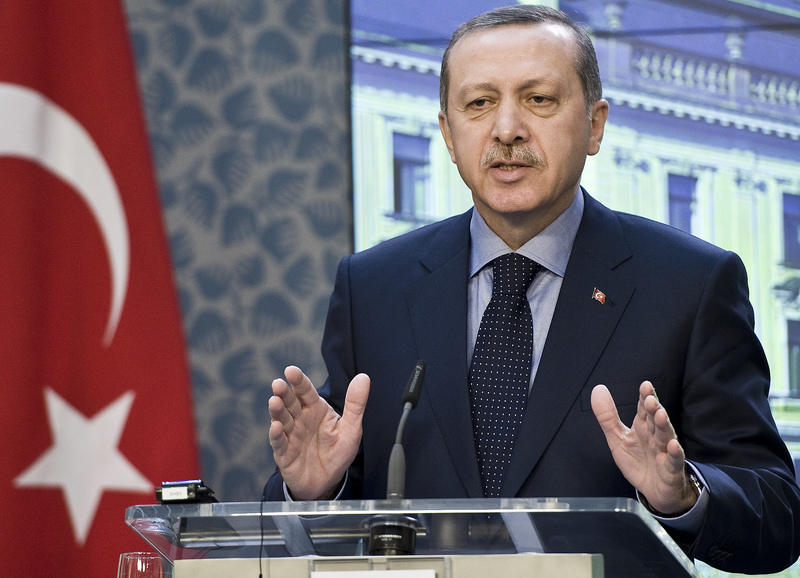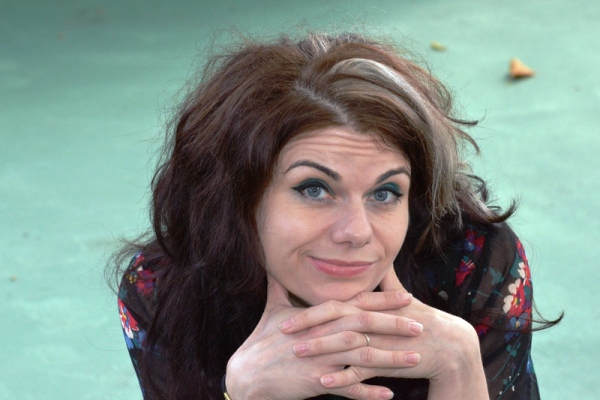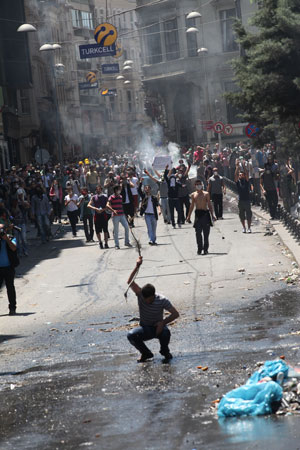Index relies entirely on the support of donors and readers to do its work.
Help us keep amplifying censored voices today.

Turkish Prime Minister Recep Tayyip Erdogan (Photo: Philip Janek / Demotix)
“What happened in Turkey during the last ten years?” When the storm is over and if we wake up to a bright morning after it’s all over, we will end up with that question at hand which could take another ten years to answer.
One answer could commence as such: A leader came upon and he taught his people a template to think by repeating it over and over again. (The frequency and length of Prime Minister’s speeches are not without cause. Their purpose is not to leave a space to think, therefore a chance to doubt for the people.)
Around the leader an alignment was formed as it happens with all leaders. That working alliance matured, deepened and ornamented leader’s modus operandi. That educated alliance, members of which were not worse than the average in society, wore the oppugning, vindictive, ambushing style and worked hard to provide an intellectual legitimation for the leader’s template. (Those who wrote headlines such as “they were not arrested for their journalistic activities,” journalists providing testimonials for KCK and Ergenekon cases for the judiciary which was already politicized, academicians feasting for “civil governance,” attorneys dancing with jackals, artists using all forms of art, from poetry to music, to be included in the photo shot of good fortune. I’m talking about a huge crowd.)
Since the rest of the people who were not included in the leader’s definition of “my citizens” meaning “the real citizens,” are considered non-human – therefore expelled from human status-, unlawful cruelty against those was accepted in the beginning, later totally ignored. Leader told “his citizens” not to consider the others, nor to feel remorse or feel for them, time and again.
Leader told to “his people” that they were the ones who were done injustice in fact, he told that many times. He told that so many times that they finally believed in him. They wanted to believe, for humanity cannot accept harm for malfeasance. Malfeasance must have a “good” reason, having something to do with benefaction, and grievance is always a good reason. At the end, party member “citizens” started to see the killing of kids by ambition for power, that are as poor as themselves, as a conspiracy against them. (A nation who does not feel remorse after seeing the face of Ali Ismail Korkmaz, a youngster beaten to death by the police during Occupy Gezi, is seriously ill, is insane.)
Leader did not only destroy justice but also the feeling of one. No one in this country can no longer relate a court of justice to jurisprudence, nobody can. Leader replaced the justice, which is supposed to be the basis of the estate with the love the masses felt for him. The behavior of the people in leader’s rallies/rites wearing shrouds and going crazy were not without reason; they sacrificed their physical and spiritual beings for the being of the leader. Leader was justice itself. As the concept of justice is related to God in ancient man’s mind.
For the length of ten years, organized ignorance, in the form of crazy and colossal crowds, mounted over freedom of opinion, human values, conscience and common denominators of humanity. They had their leader shouting “Ahead!” Numerous and grave human rights violations were experienced. It would take at least another ten years to account for those.
When the current ten years are over and a new ten years period would start, it would be more difficult for us. We would ask “what had happened?” We would like to find out by thinking over. Whilst looking for a historical reason we would end up at September 12 coup d’état. As we scratch the surface of history we would arrive at a point when “Deniz and his friends” were hanged, when in fact “kindness” was dangling on the gallows, in fact all were silent back then as well.
Maybe we would go further back to the Dersim Massacre. Maybe further back. To 1915. Maybe further back in history to the time of Ottoman sultans who slayed their brothers… We would search for “the seed of malfeasance” on this land, the first sin, the first womb of mercilessness. But it would still be very difficult to account for the last ten years. Because it is almost impossible to find a rational reason for organized ignorance, organized desire to not to think, organized unscrupulousness. If we finally decide to try those in the court of humanity, if we would have the power to do that, we then have the chore to find a courthouse big enough for all who started that system, for all who supported it and made it possible. That crowd is for sure very crowded.
*The book Radical Malfeasance Problem in Hannah Arendt” by Berrak Coskun, published by Ayrinti Publishers, inspires this article. With gratitude.
The original article in Turkish is published in Birgün Daily on January 6th, 2014. Translated to English by Stratos Moraitis. The translation was originally published at The Globe Times and is posted here with permission of the author.

2013 in the UK was the year social media became a “how” rather than a “why” issue. We’re no longer explaining what people do on the web, now we’re discussing how we behave. And we talked most about the abuse and threats received by many women on Twitter. When writer Caitlin Moran proposed a one-day Twitter boycott in August, Index’s Padraig Reidy responded. Read here

Communal censorship reared its ugly head in the UK when Madras Cafe, a Bollywood action film, was withdrawn from cinemas after protesters claimed it was anti-Tamil. Salil Tripathi likened the incident to the rows over Gurpreet Khaur Bhatti’s Bezhti and Salman Rushdie’s Satanic Verses

When Guardian columnist Suzanne Moore found herself at the centre of a storm after an article in which she described the idealised body shape of a “Brazilian transexual”, the Observer took the entirely sensible decision to commission Moore’s old friend Julie Burchill to defend her. The effect was described neatly by tweeter Stuart Houghton: “Julie Burchill has poured oil to calm troubled waters. Then drowned some seabirds in the oil. Then set fire to the oil.”
Index on Censorship refrained from getting involved. Until a government minister did…

Oh, Internet (there was a free speech point to this, honest)

As protesters filled Istanbul’s Gezi Park this summer, Ece Temelkuran explained the Turkish government’s fear of the social media generation.

Protesters in Taksim Square continue the second day of demonstrations. (Photo: SADIK GÜLEÇ /Demotix)
Ece Temelkuran asks why the Turkish government is afraid of the internet
Against a backdrop of unrest that started in an Istanbul park last week and has spread throughout the country, Turkey’s Prime Minister Recep Tayyip Erdoğan yesterday described social media as “the worst menace to society.”
In the last 10 years whenever Erdogan implied his dislike, dissatisfaction or even displeasure towards any single person or any institution, suppression has followed shortly after. That is why many protest supporters in Turkey are now expecting Twitter and Facebook to be cut off. And at the moment it is a matter of life or death for citizens of Turkey. Here is why.
As the protests, which started in reaction to plans to build a shopping centre in a park, quickly escalated and spread in reaction to police heavy-handedness, Turkish Twitter users with high number of followers have been receiving tweets crying for help from several cities all over the country. Tweets like:
“We are stuck in …. Police attacks fiercely. Please RT!”
“We are choking. The tear gas incredible. Ambulance! Please help us!”
“Don’t go to …. There is a police trap! Spread the news” “Guys in Beşiktaş! The Hotel is giving shelter. Please RT!”
Or even:
“My friend is dying. We are at …! Please help us!”
And the ones who want to help reply:
“We have anti-acid solution. Five litres. Where shall we come? RT Please!”
“We are lawyers offering legal help. Tell us where you are!”
“We have 100 gas masks. Tell us where we should leave them? RT”
Since the media has been silent on the events of the past few days, people turned to Twitter for news on the protests and tips on staying safe. These are the people Erdoğan now calls troublemakers.
A broad range of Turkish society has taken part in the protests. It is not only secularists who were concerned with rising conservatism, nor the Leftists that were constantly targeted by rising authoritarianism who are protesting: Religious conservatives have also joined the protests in large numbers.
Even the most depoliticized people have taken to the streets. Despite the massive number of arrests and threats personally from the PM, the anger at the moment is out of control in several cities. It is not only police tactics in dealing with the protests that have caused public outrage, it is the “vocabulary” of the prime minister.
Prime Minister Erdoğan yesterday described the thousands of protestors as “bunch of looters” and Twitter users as “provocateurs”.
Many Turkish tweeters have added “the looter” to their name on Twitter, embracing the description of the PM. The “troublemakers” have their own outlet now. They don’t need the mainstream media as much as they needed them before. For Turkey’s authorities, this is big trouble, for sure.
Related: Turkey losing its way on free speech
The protests erupting across Turkey have shown a wider audience – domestic and international – the increasingly problematic nature of Turkish democracy, and its growing authoritarian tendencies. Index on Censorship CEO Kirsty Hughes writes
 The trial of several journalists accused of being involved in an alleged plot to overthrow the Turkish government had degraded the status of press freedom in the country, writes Ece Temelkuran
The trial of several journalists accused of being involved in an alleged plot to overthrow the Turkish government had degraded the status of press freedom in the country, writes Ece Temelkuran